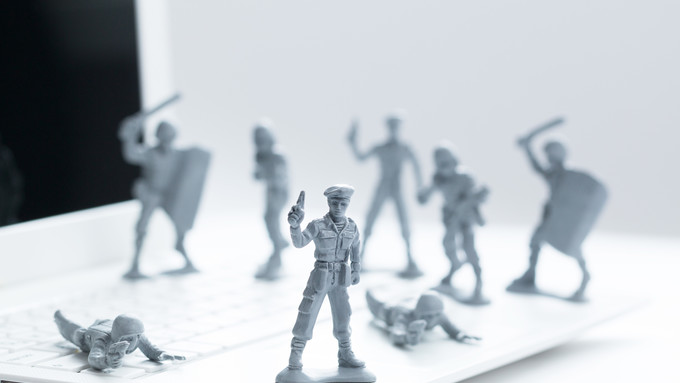Turning Back the Tide of Leftist Influences: Part 1
Part 1 | Part 2
September 11, 2001 marks a significant turning point for American Muslims. Prior to this, an overwhelming majority of the community was socially conservative and more insular. The rise of Islamophobia emanating from conservative pundits, the Religious Right and the GOP had the effect of pushing many Muslims into the arms of the Progressive Left that seemingly appeared to be less anti-Muslim. As a consequence of the perception that the Left provided more of a socio-political safe space, some within the community, especially among Generation X and more so among Millennials, began to absorb much of the sensibilities, nomenclature and posture of the Left which has expressed itself in varying ways, one being the embrace of the folly of moral relativism.
Moral relativism is the position that people are free to have their individual truths and that these truths can all be equally true. Moreover, if morality is not static, then morality can be redefined in terms of more diverse standards in favor of norms which traditionally transcended space and time. If one outside of this framework asserts that specific positions are incontrovertible (qati’) relating to morality and states the opposite of those are immoral and should not be promoted, that individual is called intolerant or told “Don’t judge.”
People Are Judges but Not the Ultimate Judge
Is not Allah the Best of Judges? (Surah at-Tin, Ayah 8)
Imam ash-Shafi’i (may Allah be pleased with him) said, “I was commanded to judge with the outward while Allah is connected to non-apparent matters.”
We are not supposed to make judgments to assess persons’ human value, their intentions and their after-lives. We, however, are to make individual judgments as a natural function of intellect in order to advance, in a healthy manner, our own individual selves, families, groups and society as a whole. All societies have judges to enforce the law when people step outside of the boundaries of what has been legislated by governments compromised of men and women. These judges have a criterion in which there are parameters that differentiate right from wrong. Even many of those who verbally project moral relativism and say “Don’t judge” still have a criterion and judge people as being wrong or bigoted who disagree with them.
Al-Qur’an, Prophetic Statements and Absolute Consensus of Early Muslim Should be the Criterion—Not the Left’s Framework
And whoever does not judge by what Allah has revealed, they are from the ingrates – (Surah al-Ma’idah, Ayah 44)
And whoever does not judge by what Allah has revealed, they are from the wrongdoers – (Surah al-Ma’idah, Ayah 45)
And whoever does not judge by what Allah has revealed, they are from the transgressors – (Surah al-Ma’idah, Ayah 47)
The three ayaat stated above directly refer to the People of the Book but are also are warnings for Muslims. Those who decided to act upon their own whims while ignoring or covering up what Allah (Mighty & Sublime) revealed are referred to as Al-Kaafireen, Al-Thaalimeen and Al-Faasiqeen. The Al-Kaafireen (ingrates) are those who covered the Divine truth given to them; therefore, they showed a lack of gratitude for that which was revealed to guide them towards success. The Al-Thaalimeen (wrong-doers) are those who have committed wrong because they took matters out of their proper places in which they were ordained to be. All three of these groups mentioned were those who professed belief in One Deity and had religious affiliations yet were spoken of in these terms. In these are signs that we can go astray from the path by not judging matters by what was revealed.
It is not befitting for a believing man or believing woman that when Allah and His messenger decree a matter that they have an opinion about it, and whoever disobeys Allah and His messenger have clearly gone into manifest error – (Surah al-Ahzab, Ayah 36)
Oh you who believe! Obey Allah, obey the messenger and those in authority among you. And if you disagree over anything, refer it back to Allah and the messenger if you believe in Allah and the Last Day. That is better and is the most excellent interpretation – (Surah an-Nisa, Ayah 59)
Though there is room for interpretation on some issues, there are specific matters which have been made clearly unlawful in Al-Qur’an, by the Prophet ﷺ, and agreed upon to be forbidden by his pious family and descendants and righteous companions. These matters cannot be subject to reinterpretation as morally permissible. Those who believe in Al-Qur’an are obligated to obey the Prophet ﷺ on that which can be authenticated through sound transmission, which does not contradict Al-Qur’an. Similarly, the absolute consensus of the early community on how specific matters were understood that agree with the Qur'an and the Prophetic teachings are confirmation.
Being Courageous in the Face of Leftist Influences
There is no doubt that there needs to be more emphasis on teaching the Islamic tradition in a more robust manner which offers American Muslims not only guidance to wade through the socio-political sea of America but also offering solutions to problems. Part of the problem is that many Muslims are unclear regarding the non-negotiable issues within Islamic creed. This is also the time for those who firmly adhere to this tradition to have moral courage (ash-shaja’a) in the face of intolerance that seeks to shut down debate or introduce heterodox ideas among Muslims in the name of plurality. Modeling a particular code of morality in the public as well as not wavering on theological non-negotiables is a means in which the tide can be turned to bring more of the community back to the middle path. This will not win any popularity contests and may cause a few allies to fall by the wayside. Nonetheless there needs to be more committed Muslims standing up as a group to (re)build communities and institutions to bring clarity in the face of confusion and to inspire those who are more timid to become more resolute without being hostile.
Activism Related Articles



Why We Must Recapture Scholarly Discourse from Extreme Bloggers
One cannot deny the move towards rhetoric and practice in the Western Muslim community that is more liberal, reformist, and progressive, but the extreme position some have taken in response to it is not only harmful, ineffective, and unwise, but decidedly un-Islamic.